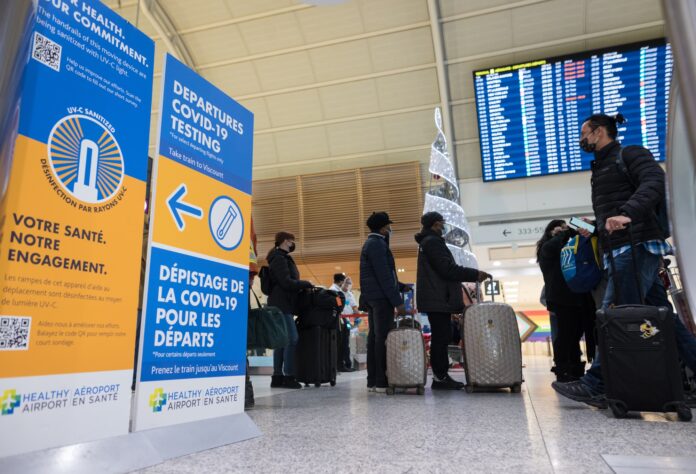Canada has been increasing its capacity to test air travellers on arrival at Canadian airports, Duclos told reporters at a press conference Friday.
On Nov. 30, Canada had the capacity to test 11,000 air travellers a day, and as of last Friday was testing 21,000 a day. Full capacity would be to test 23,000 a day, Duclos said.
Trending Stories
Ontario reports 3,453 new COVID cases as test positivity reaches almost 10%
Premier Doug Ford can’t get into his home due to protesters, spokesperson says
On Tuesday, Canada surpassed its 23,000 goal and now has the ability to test 26,000 travellers a day, a Public Health Agency of Canada spokesperson told Global News.
Story continues below advertisement
Under the new rules, fully vaccinated travellers must quarantine at home until they receive their test results. They will either be tested at the airport, or receive a self-swab kit with instructions on how to use it.
Fully vaccinated travellers who test positive must isolate for an additional 10 days from the time they took their arrival test, the spokesperson added.
The rules for unvaccinated or partially vaccinated travellers remain the same, meaning they will continue to be get tested upon arrival as well as on day eight, and they must quarantine for 14 days.
Meanwhile, fully vaccinated travellers entering from the United States, and who have not travelled outside Canada or the U.S. in the last two weeks, may be randomly selected for a mandatory arrival test. They don’t have to quarantine while awaiting their results, the spokesperson said.
Regardless, Duclos has been adamant that Canadians should avoid non-essential travel abroad, which follows a formal advisory the government put in place last Wednesday.
“I will say it again: now is not the time to travel,” Duclos said Friday.
Global News contacted several international airports to inquire about testing capacity and arrival wait times ahead of the busy holiday rush.
Story continues below advertisement
The Calgary International Airport has a goal of processing 1,800 tests per day, a spokesperson said. During peak wait times, it could take 45 minutes to an hour to get tested.
The testing provider at the airport can also provide take-home kits to those travellers who’ve pre-registered for testing, the spokesperson added. It hasn’t heard of any supply issues.
Vancouver International Airport has added more testing space to accommodate arriving travellers, a spokesperson said. Current wait times range from an hour to an hour and a half for passengers to complete the requirements at the airport – like customs and testing – the official said.
A spokesperson for Aéroports de Montréal, which oversees Montréal–Trudeau International Airport, said by email the agency has been working with the government and its service providers to increase testing capacity.
“These additional screening measures may lead to delays in border processes at the international arrivals level especially during peak periods,” the spokesperson said, but did not provide a time range.
Back in Toronto, the GTAA spokesperson said the agency continues to “work with the federal government and our agency partners to find efficiencies in the arrivals process while prioritizing health and safety above all else.”
Story continues below advertisement
The recent travel measures implemented by the government are forcing some people to rethink their plans, said Beth Potter, president and CEO of the Tourism Industry Association of Canada.
Potter told Global News the slew of Omicron travel announcements is causing confusion.
“I would make sure that they continue, both before they go and during their trip, to keep an eye on what Canada is doing and what their travel and re-entry requirements are because as we’ve seen, things can change rather quickly,” Potter said.
“You want to make sure that you really understand what you need to do.”
Potter also advises travellers to check their cancellation and travel insurance policies before travelling, and to also have quarantine plans in place for their return home if they test positive.
Story continues below advertisement
Travel pivot: Advice from expert on adapting your travel plans
Most of all, Potter hopes the travel restrictions are “temporary.”
“Make sure that you’re constantly evaluating the necessity of them,” she advises the government.
“The industry has been incredibly hard hit, and this is just another blow.”
— with files from The Canadian Press
© 2021 Global News, a division of Corus Entertainment Inc.



